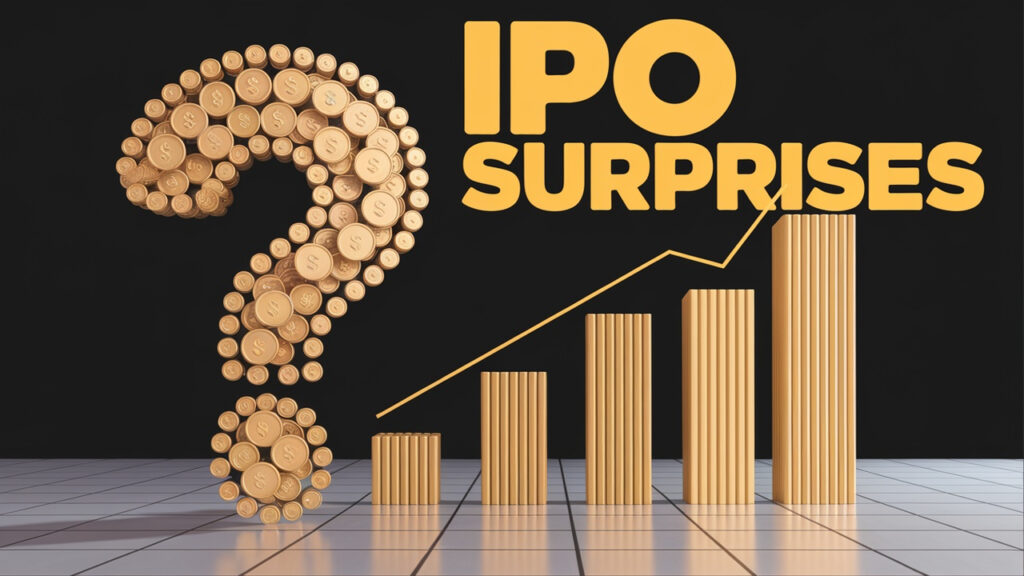Initial Public Offerings—or IPOs as we all familiarly know them—have turned into headline news in India’s financial world. When a firm goes public, it’s not merely raising capital or listing on the exchange. It’s a change. A coming-of-age experience. A combination of strategy, thrill, and drama.
But aside from the jargon of valuations and subscription numbers, IPOs have plenty of behind-the-scenes, quirky, and downright interesting stories that seldom receive the spotlight. This article reveals 10 such interesting and surprising IPO facts that you most likely haven’t heard yet.
So, if you’re a market buff, a first-time investor, or simply someone who loves financial trivia, this list is for you.
The First IPO Was Over 400 Years Ago—And Paid Dividends in Spices!
When we hear the term IPOs, we associate it with contemporary companies going public on NSE or BSE. But did you know that the origin goes back to 1602?
The Dutch East India Company then became the first publicly traded company in the world when it sold shares of stock to the public on the Amsterdam Stock Exchange. Private investors were permitted to invest in the company’s international trading business, and here is the fun part: dividends were occasionally issued in spices such as nutmeg or pepper rather than cash.
Spices at that time were worth their weight in gold. So shareholders literally got “spicy” returns in a way.
Why it matters today:
This IPO was the building block for stock markets today. To imagine that we do this now through trading apps, while it began with handwritten journals and spice shipments is amazing!
Zomato’s IPO Made Over 300 Employees Crorepatis Overnight
You would be surprised how IPOs not only benefit investors.
Zomato’s 2021 IPO did more than make the news as one of India’s largest tech listings. It turned over 300 employees into crorepatis. A few used some of their Employee Stock Option Plan (ESOPs) to purchase a home, repay loans, or even fund businesses.
This wasn’t a one-off. During the dot-com era in the US, Google and Facebook made thousands of “IPO millionaires.” In India, Policybazaar, Nykaa, and MapmyIndia have all had similar tales after going IPO.
What does this imply for job seekers?
Getting into a startup with ESOPs may not make you rich today, but it might make your life richer tomorrow.
Oversubscription Can Go Beyond 300x (No, That’s Not a Typo)
When we say an IPO is oversubscribed, we mean that demand exceeds the number of available shares. But sometimes, it’s not just a bit more—it’s hundreds of times more.
Take Latent View Analytics. In November 2021, its IPO was oversubscribed 326.5 times. Similarly, Paras Defence and Space Technologies was oversubscribed 304 times.
Imagine 300 people fighting for 1 samosa—that’s the level of investor madness we’re talking about.
Retail investor takeaway:
Receiving an allotment in such IPOs is a matter of winning a lucky draw. That’s why IPO forums are filled with jokes like, “Got more chance in IPL prediction than IPO allotment!”
Not Every IPO Raises Fresh Money—Some Just Help Existing Investors Exit
Most people believe that companies go public to raise funds for growth, expansion, or repayment of debt. That’s true in most cases. But not all IPOs are like that.
Occasionally, the IPO is an Offer for Sale (OFS)—where current shareholders, such as founders or early investors, sell their own shares to the public. The company itself does not receive any money.
One good example is the LIC IPO, where the Government of India offered part of its holding. LIC did not raise any new funds.
What should you look out for?
Always check the Red Herring Prospectus (RHP) to determine if the IPO is a fresh issue or OFS—or both.
Google’s IPO Was Run Like a Lottery
When Google went public in 2004, it did not wish to take the conventional Wall Street path. So it opted for a Dutch auction style, wherein investors placed bids for what they were willing to pay and how many shares they desired.
The price was determined based on these bids—₹85 per share—and Google raised $1.67 billion.
It was viewed as a more equitable and transparent method of proceeding, deviating from the customary methods of raising funds.
The take-away:
Reasonable pricing techniques can be made available to the masses through IPOs, but they’re seldom employed in India.
IPO Roadshows Are Like Bollywood Promotions—Just More Polished
Prior to going public, firms embark on what is referred to as a roadshow. These are official presentations where promoters, CFOs, and senior management visit key cities (and sometimes abroad) to persuade institutional investors to invest in the IPO.
But here’s what you might not know—these roadshows are often as flashy as a movie promotion. Held in five-star hotels, with polished slide decks, rehearsed speeches, and a full PR team, these events are all about creating the right buzz.
Fun fact:
Some roadshows even take place in New York, London, Dubai, and Singapore to attract global investment funds.
Celebrities Have Tried Their Luck with IPOs Too
IPOs aren’t just for traditional businesses.
Madonna, the pop star, had her record label Maverick participate in the Warner Music Group IPO.
Donald Trump went public with his casino business in 1995.
In India, Sachin Joshi, an actor and entrepreneur from Bollywood, floated an IPO for his company Viiking Ventures (the one that acquired Kingfisher Villa).
Some of these IPOs failed, some were successful—but they indicate that even celebrities want a share of the stock market action.
Some Indian IPOs Are Astrology-Timed
Sounds incredible? But it’s true.
In India, certain promoters refer to astrologers and numerologists to select “auspicious” days to issue their IPOs. From selecting the day of the week to even the price band numbers—some companies attempt to synchronize everything to the stars.
One company even went ahead and delayed its IPO because of a planetary shift.
Although this is not an official rule, it is still a reminder of how deep Indian cultural beliefs run—even in financial markets.
The Grey Market Offers a Sneak Preview—But It’s Not Official
You must have seen IPO GMPs circulating on websites and WhatsApp groups. That’s from the Grey Market—an unofficial platform where IPO shares are traded and sold ahead of listing day.
If an IPO is quoted at ₹100 and quoted in the grey market at ₹50, it could list somewhere about ₹150.
But wait, there’s more: it’s not SEBI-regulated, and it’s cash-based, outside the organized financial system.
Should you use GMP?
It’s helpful for understanding market mood—but no guarantee. Numerous IPOs that had a high GMP but ended up opening flat on the listing day.
Large IPOs Do Fail—and Small Ones Can Grow to Be Giants
Not every IPO is a dream come true.
When Amazon launched its initial public offering in 1997, it was priced at only $18 a share, and most analysts considered it only an “online book store.” Forward to today, and it’s a worldwide technology giant.
Paytm’s 2021 IPO in India raised ₹18,300 crore—India’s largest IPO in history. But its shares declined by 27% on the listing day.
Moral of the story:
Listing day success is not all. Long-term performance is based on fundamentals, not hype.
Final Thoughts -Interesting and Surprising IPO Facts
IPOs are not just money events—they’re full of stories of surprise, risk, and even a dash of desi drama.
From 400-year-old IPOs with spice dividends to celebrity-backed listings and astrological date planning, the IPO world is anything but boring.
Whether you invest for listing gains or long-term growth, it’s reassuring to know that behind each IPO is a special story. So the next time you hear about an upcoming IPO, remember—it’s not all about numbers. There could be something interesting going on behind the scenes.
Quick Summary Table
Fact What Makes It Interesting
1 First IPO in 1602 paid in spices
2 Zomato IPO made 300+ crorepatis
3 Latent View IPO oversubscribed 326x
4 LIC IPO did not raise funds for LIC
5 Google utilized a Dutch auction for its IPO
6 Roadshows are high-profile shows
7 Trump and Madonna among celebrities who took the IPO route
8 Astrology, at times, determines IPO listing dates
9 Grey Market provides pre-listing tips (informally)
10 Even large IPOs like Paytm can fail
What Do You Think?
What fact surprised you the most? Did you apply for any recent IPOs? Do you track GMP before investing?
Leave your comments.


